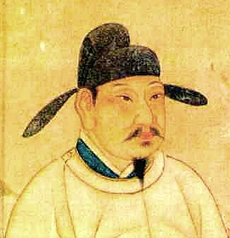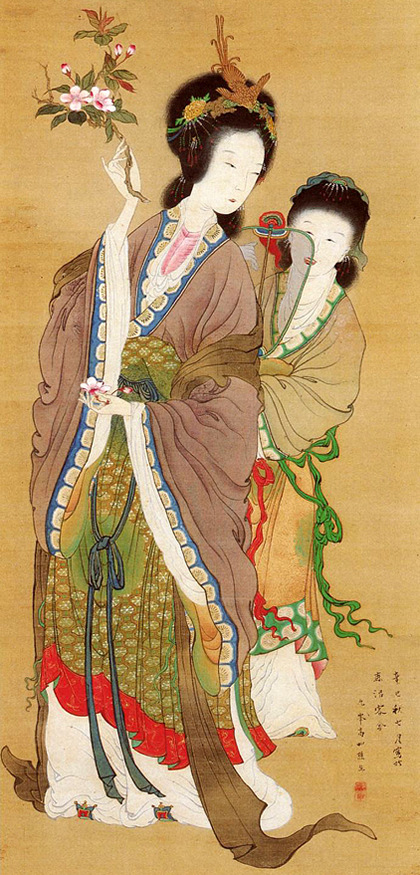World History
Li Longji (Li Lung-chi) reigned 712–756 as Ming-huang (Ming-huang means Brilliant Emperor; Xuan-zong was his posthumous title). He was the grandson of Empress Wu Zhao and son of Ruizong (Jui-tsung, r. 710–712), who abdicated in his favor. His youth was spent under house arrest in his grandmother’s court.
His reign marked the zenith of the Tang (T’ang) dynasty, the first 40 years of which were of peace and prosperity. His court was brilliant and elegant, with 2 million people living within and outside the walls of his capital city, Chang’an (Ch’ang-an), then the largest and most cosmopolitan city in the world.
His reign inaugurated the golden age of Chinese poetry; the works of the great poets Li Bo (Li Po), Du Fu (Tu Fu), and others are still celebrated in China and Japan. A patron of the arts, he set up the Hanlin Academy at court, where the best scholars, writers, and artists were nurtured.
Minghuang began his reign by sweeping away the favorites and corrupt ofï¬ cials who had been allowed to flourish during Empress Wu’s last years and during the ineffective reigns of her two sons, Minghuang’s uncle and father.
He was a conscientious ruler who worked hard in administration, kept himself informed of the conditions of his people, kept down court extravagance, abolished capital punishment, and pursued a vigorous foreign policy that kept peace along the borders.
Minghuang however lived too long for his and the dynasty’s good. At age 60 he fell in love with Lady Yang, concubine of one of his sons. He forced his son to divorce her and brought her to his own court with the rank of Guifei or Exalted Consort. She was famous for her obesity and made being fat fashionable.
Doting on her, he abandoned his responsibilities and settled to a life of luxurious indulgence with her, while ennobling her sisters and other relatives and making her brother Yang Guozhong (Yang Kuo-chung) chief minister.
Under the Yang family’s dominance honest officials lost all influence. Yang Guifei’s scandalous behavior included “adopting†the clownish and scheming Turkic general An Lushan (An Lu-Shan) as her son and promoting him to the rank of prince.
An rose to be commanding general of over 150,000 of the empire’s best troops stationed in the north. In 755 An rose in rebellion, captured the eastern capital Luoyang (Loyang), proclaimed himself emperor, then marched on Chang’an. Minghuang and the court fled the capital and headed southward, seeking refuge in Sichuan (Szechwan) province.
However his guards refused to fight until they had killed Yang Guozhong. They then forced him to hand over Yang Guifei and strangled her. Minghuang abdicated in shame and grief in 756. It fell to Minghuang’s son and successor Suzong (Su-tsung) to quell the rebellion, at great cost, in 763.
The Tang dynasty never recovered from its consequences. The tragic end of Minghuang and Yang Guifei’s love has inspired great poetry and became the subject of famous paintings.
- Sui Dynasty
Sui Dynasty This short-lived dynasty (581–618) is enormously important in Chinese history because it restored unity to a country that had been divided since the fall of the Han dynasty in 220. For 300 years before its creation China had moreover...
- Taizong (t’ang-tsung) - Chinese Emperor
Taizong (T’ang-tsung) - Chinese Emperor Tang Taizong (T’ang T’ai-tsung), meaning “Grand Ancestor of the Tang,†is the title of the second ruler and real founder of the Tang (T’ang) dynasty in China (618–909)....
- Battle Of Talas River
Battle of Talas River In 751 a Tang (T’ang) dynasty army commanded by Gao Xianzhi (Kao Hsien-chih), military governor of Anxi (An-hsi) in the Western Regions, met an Arab army in battle at Talas River near Samarkand. The Chinese were defeated....
- Tang (t’ang) Dynasty
Tang (T’ang) Dynasty The Tang dynasty (618–907) brought three centuries of greatness to China, called the second imperial age, continuing and consolidating the unification of China that the preceding Sui dynasty (581–618) had begun....
- Wu Zhao (wu Chao) - Chinese Empress
Wu Zhao (Wu Chao) - Chinese EmpressWu Zhao or Zetia (Tse-tien) is famous in Chinese history because she was the only woman who ruled in her own name. Daughter of an official of the recently founded Tang (T’ang) dynasty she was selected to join...
World History
Xuanzong (Hsuan-tsung) - Chinese Emperor
 |
| Xuanzong - Chinese Emperor |
His reign marked the zenith of the Tang (T’ang) dynasty, the first 40 years of which were of peace and prosperity. His court was brilliant and elegant, with 2 million people living within and outside the walls of his capital city, Chang’an (Ch’ang-an), then the largest and most cosmopolitan city in the world.
His reign inaugurated the golden age of Chinese poetry; the works of the great poets Li Bo (Li Po), Du Fu (Tu Fu), and others are still celebrated in China and Japan. A patron of the arts, he set up the Hanlin Academy at court, where the best scholars, writers, and artists were nurtured.
Minghuang began his reign by sweeping away the favorites and corrupt ofï¬ cials who had been allowed to flourish during Empress Wu’s last years and during the ineffective reigns of her two sons, Minghuang’s uncle and father.
  |   |
He was a conscientious ruler who worked hard in administration, kept himself informed of the conditions of his people, kept down court extravagance, abolished capital punishment, and pursued a vigorous foreign policy that kept peace along the borders.
Minghuang however lived too long for his and the dynasty’s good. At age 60 he fell in love with Lady Yang, concubine of one of his sons. He forced his son to divorce her and brought her to his own court with the rank of Guifei or Exalted Consort. She was famous for her obesity and made being fat fashionable.
Doting on her, he abandoned his responsibilities and settled to a life of luxurious indulgence with her, while ennobling her sisters and other relatives and making her brother Yang Guozhong (Yang Kuo-chung) chief minister.
Under the Yang family’s dominance honest officials lost all influence. Yang Guifei’s scandalous behavior included “adopting†the clownish and scheming Turkic general An Lushan (An Lu-Shan) as her son and promoting him to the rank of prince.
 |
| Yang Guifei |
An rose to be commanding general of over 150,000 of the empire’s best troops stationed in the north. In 755 An rose in rebellion, captured the eastern capital Luoyang (Loyang), proclaimed himself emperor, then marched on Chang’an. Minghuang and the court fled the capital and headed southward, seeking refuge in Sichuan (Szechwan) province.
However his guards refused to fight until they had killed Yang Guozhong. They then forced him to hand over Yang Guifei and strangled her. Minghuang abdicated in shame and grief in 756. It fell to Minghuang’s son and successor Suzong (Su-tsung) to quell the rebellion, at great cost, in 763.
The Tang dynasty never recovered from its consequences. The tragic end of Minghuang and Yang Guifei’s love has inspired great poetry and became the subject of famous paintings.
- Sui Dynasty
Sui Dynasty This short-lived dynasty (581–618) is enormously important in Chinese history because it restored unity to a country that had been divided since the fall of the Han dynasty in 220. For 300 years before its creation China had moreover...
- Taizong (t’ang-tsung) - Chinese Emperor
Taizong (T’ang-tsung) - Chinese Emperor Tang Taizong (T’ang T’ai-tsung), meaning “Grand Ancestor of the Tang,†is the title of the second ruler and real founder of the Tang (T’ang) dynasty in China (618–909)....
- Battle Of Talas River
Battle of Talas River In 751 a Tang (T’ang) dynasty army commanded by Gao Xianzhi (Kao Hsien-chih), military governor of Anxi (An-hsi) in the Western Regions, met an Arab army in battle at Talas River near Samarkand. The Chinese were defeated....
- Tang (t’ang) Dynasty
Tang (T’ang) Dynasty The Tang dynasty (618–907) brought three centuries of greatness to China, called the second imperial age, continuing and consolidating the unification of China that the preceding Sui dynasty (581–618) had begun....
- Wu Zhao (wu Chao) - Chinese Empress
Wu Zhao (Wu Chao) - Chinese EmpressWu Zhao or Zetia (Tse-tien) is famous in Chinese history because she was the only woman who ruled in her own name. Daughter of an official of the recently founded Tang (T’ang) dynasty she was selected to join...
